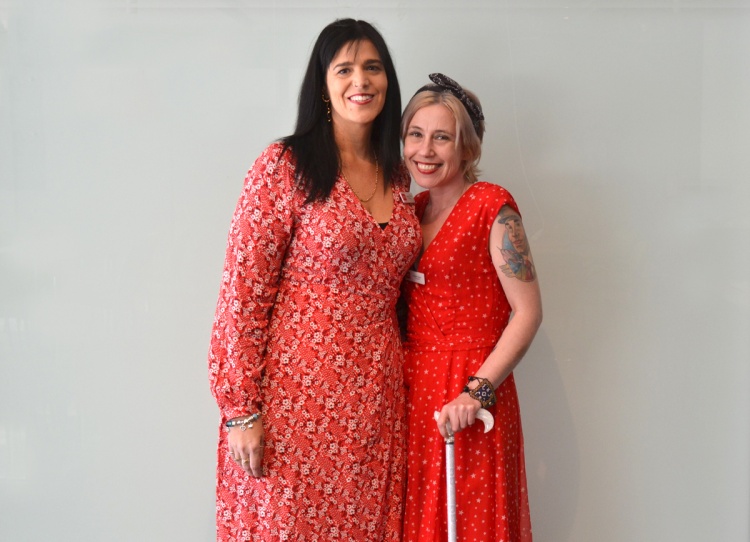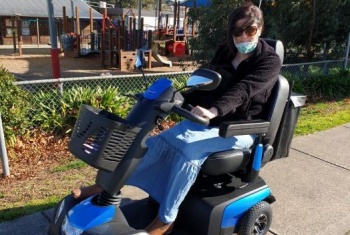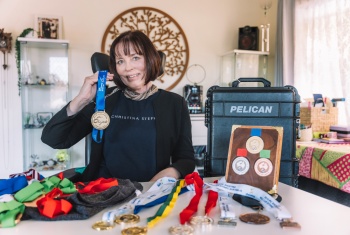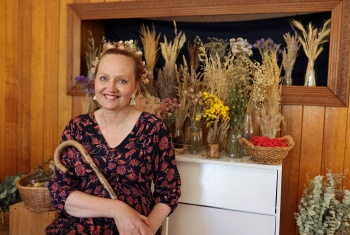When Karen Dare and Justine Martin crossed paths at a Multiple Sclerosis (MS) ambassador training session five years ago, they had no idea of the powerful friendship that would ensue.
Both were single mothers and both had relapsing-remitting MS. Justine had relocated to Geelong from Western Australia and had recently started receiving support from the National Disability Insurance Scheme (NDIS), which was proving life changing. Karen on the other hand, had been living with MS for 15 years and wasn’t an NDIS participant yet. Life for her at that time was bleak.
“I’d only ever met my grandmother, who had MS, once, and all I could remember was that she was in a wheelchair, she could barely see and she was really grumpy. So when I found out I had MS, I thought oh my god, I’m going to end up just like her,” Karen said.
Karen was newly married, living in America and pregnant with her second child when she was diagnosed with MS just shy of her 21st birthday. She had a young son, no family close by and was in an abusive relationship, so the early warning signs went unnoticed for close to four years.
“I used to run when I was younger and my legs would tingle afterwards. I just thought I’d had a really good workout. I was also in a play and my speech became garbled – it was frustrating and embarrassing, but I put it down to being confused learning my lines. Then three days after I was married, I was driving my Dad to the airport in Washington State and my vision went blurry. I now know they were all MS symptoms,” Karen said.
Forty eight-year-old Justine’s diagnosis was even more prolonged, taking eight years from when her symptoms first appeared.
“My vision started to go in 2002. It was like someone had smeared Vaseline over my eyes, but I put it down to the mascara and eyeliner I was wearing because it cleared up after a couple of months,” Justine said.
“In 2007 I was competing in All-Round Weightlifting and was off to the world championships in New Zealand when my left arm went all funny a couple of days before I was due to leave. I thought I’d strained my bicep and was going to get it looked at when I got back, but by the time I got home it was gone and I never thought much more about it.”
During a visit to her GP in 2010, Justine mentioned her eyesight had become blurry again. More than eight months later, she found herself in a neurologist’s room faced with an MS diagnosis.
“It’s terrifying when you’re diagnosed for the fear of the unknown, if you don’t know much about it. But it’s also terrifying if you’ve had a loved one who’s been through it and you’ve seen what it can do at its worst,” Justine said.
When Justine was nine-years-old, her mother was diagnosed with MS. She spent much of her young life caring for her and watched the disease ravage her mother’s body before she succumbed to complications and passed away in 1997.
While both women endure crippling fatigue, pain, poor vision, cognitive impairment and reduced mobility, which affects everything from simple tasks like cooking a meal to driving a car, their passion for life and sense of humour is as strong as their friendship.
“There’s hilarious things I can tell you from a women’s perspective about having MS, like going to get your legs waxed and almost kicking the waxer in the face because of the nerves in your legs,” Karen said.
Both women, who prior to the NDIS received very little support, credit the Scheme with having an enormous impact on their quality of life. They receive funding to help them with things like accessing the community, assistance with personal care and domestic tasks, transport, physiotherapy and occupational therapy.
“I joke with my friends and family – be careful what you wish for in life. All I ever wanted was a house cleaner and a gardener. Then I’d know I would have made it in life. I have both of those things now, but what I wouldn’t give to be able to do it myself,” Justine said.
“Having to give up work eight years ago was horrendous. What was my purpose going to be? I’ve been on treatment that costs hundreds of thousands of dollars, then you go and add my NDIS funding, that’s a lot of money I’m taking out of the Australian system. How was I going to contribute back into it? That was really important to me and to give me back some purpose in life.”
Justine still leads a very active and full life, with the help of the NDIS. She’s an MS Ambassador, vice president and media manager for Barwon Heads Arts Council and a consumer representative for Barwon Health, where she was this month recognised with the 2019 Consumer Representative Outstanding Volunteer Achievement Award. She’s also an award-winning artist and was recently presented with the 2019 Geelong Women in Community Life Award for Living with a Disability.
Karen says MS has stolen a lot from her, but the NDIS has helped her so much.
“For years, I’d been using my Dad’s old walking stick. We bought it for him as a joke when he turned 50, then it became my walking stick. With the NDIS, I’ve been able to buy my own. I’ve never had the money to get a wheelchair, so I’ve been using Justine’s old one, now I’m going to get my own chair.”
“I’ve got the flexibility in my NDIS plan to use my funds where I need them, like if I need to catch a taxi, I can use some of my funding. It’s made a huge difference in my life. Things are tough, but it would be so much tougher without the NDIS.
“MS is a bitch, but at least Justine and I found each other.”
The NDIS provides Australians under the age of 65 with a permanent and significant disability the supports they need to live an ordinary life and to increase their social and economic participation. The NDIS is now providing support to more than 250,000 Australians.
MS is a progressive neurological disease that affects more than 25,000 Australians. As yet, there is no cure. The NDIS supports more than 5500 participants with MS. 30 May marks World MS Day, which helps raise awareness and bring the global MS community together.



